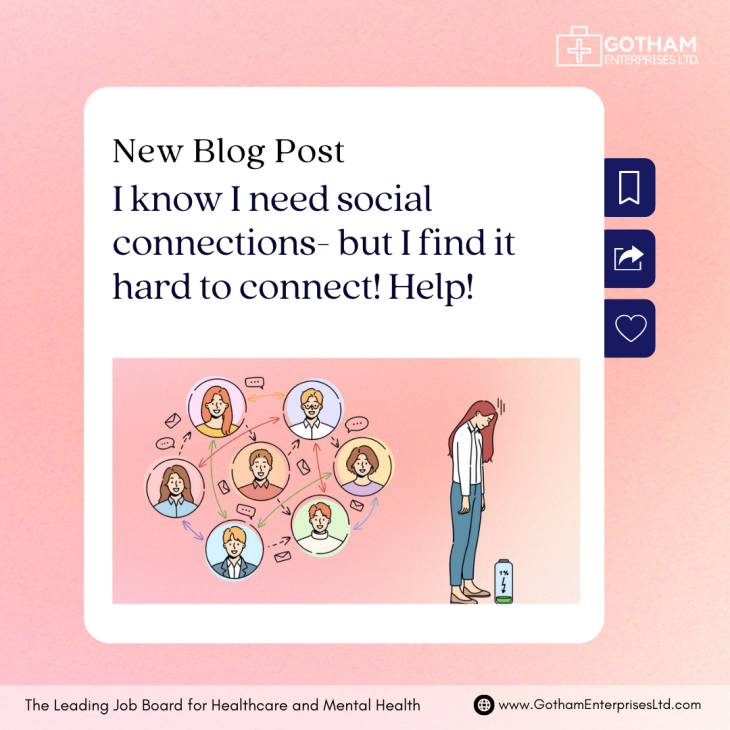Recent Posts
- I broke up with my partner, but now I am having doubts. Did I do it out of the right reasons or was I just being fearful?
- My Quick Temper Pushes People Away. What Do I Do To Manage My Anger?
- How does noise affect my mental health?
- I want to be a better problem solver. What is a step by step approach?
- Escapism. When is it healthy? When is it damaging?
Most Popular
I know I need social connections- but I find it hard to connect! Help!

What adds zest to life? What transforms a good day to a great day? It’s probably social interactions that bring interest, fun and ultimately, bring meaning to an otherwise dull day. How we wish though that social interactions are just as easy as watching the characters of our favorite sitcom banter on screen. How we wish we had the same confidence and self-esteem!
The truth about social connections is that they involve skills and the right state of mind. Luckily, our minds continue to learn, grow and evolve as we provide it with knowledge and training.
Developing the skills
- Skills rest on knowledge.
Maybe one reason why it is hard to connect with others is the lack of knowledge. Resources for social skill knowledge can be training or seminars, books, workshops and even observation. As our knowledge of theory grows, our mind’s resources increase, making it easier for us to choose what techniques or skills to apply in a particular social situation.
- Diffuse the anxiety that may be blocking the skills.
It is definitely possible that we are already skilled in making social connections. The thing that gets in our way to enjoying our people skills is our fear of connection.(1) If we have identified that it may be anxiety that prevents us, talking to licensed counselors or psychologists for assessment and possible treatment might be helpful.
Top Tips to Develop Social Skills for Smoother Social Connections
- Body language
Learn about body language and how to interpret gestures, postures, expressions of the face and eyes, and touch. It is amazing how the majority of communication happens without words! Having the skill of decoding body language can tell us the speaker’s mood and true emotions.
- Listening skills
Connection involves making the other person feel special. How do we do it? By listening more and speaking less. This means training ourselves to be interested in what the other person is saying, rather than dominating the conversation with talk about ourselves. The skill of active listening, where you practice eye contact, open posture and welcoming gestures, while focusing on the speaker’s interests, is a gem. Asking them questions is also a skill to develop. Once they feel heard by you, they will surely feel connected to you.
- Positive energy
It’s true that people gravitate towards others who radiate positive energy. It can come off as enthusiasm, keen interest, or even just a smiling face. A simple interaction with someone with positive energy can make a person’s day.
- Names
It is quite uncomfortable being in a great conversation with someone while at the back of your head, you are trying hard to call to mind what their name was. To help our brain connect faces with names, we can repeat their names several times in conversations. We can also associate their name with a pleasant memory so it is easier to recall. This tip might seem trivial, but being thoughtful about people’s names actually makes them feel special.
- Compliments.
As the saying goes, a little compliment goes a long way. Noticing and actually verbalizing something good about the other person may seem insignificant, but it helps make a welcoming and positive environment. We don’t have to be over the top or to make up a compliment that is not true. A simple, “I like your shirt” or “That color looks good on you” counts! Eventually, as you strengthen your connection with the person, you can see more and more of their positive qualities.
- Appearance.
In a world where people can judge us in the first 8 seconds of meeting us, what we say may come in only second in making a good first impression. Oftentimes, how we appear is our first step to building connections. This does not mean looking made-up all the time, but it means having good hygiene. It makes approaching a person much easier.
Helpful Tips to Ease Discomfort and Build Connections in Social Settings
- Break down the walls.
There are moments when social skills are already present, but they come with the feeling of being overwhelmed by dread whenever in a social gathering or even in a one-to-one conversation. In this case, assessment and insight from a licensed counselor or mental health worker might be fruitful. They are trained to properly recommend programs based on our specific needs. Breaking the anxiety gives us freedom to pursue more social connections.(2)
- Take it one at a time.
Once situations that trigger the overwhelming feelings and our skill deficiencies are identified, we can learn the skills one at a time. The reality is that skills are applied repeatedly before they become part of who we are and what we do.
With these tips, we can make life more meaningful by building the foundation of our social skills and by removing possible obstacles. Truly, as you enjoy building social connections, you enjoy the spice of life!







Comments